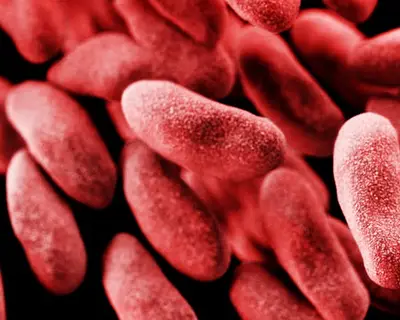RESEARCH TRIANGLE PARK, N.C. – Scientists developing life-saving new antibiotics in the United States and five other countries will share up to $17.6 million in funding to treat the world’s deadliest superbugs.
A year since launching the international partnership, the Combating Antibiotic Resistant Bacteria Biopharmaceutical Accelerator, CARB-X ,announced its second round of antibiotic research and development funding, awarding seven projects in six countries — two in the United States, and one each in France, India, Switzerland, Ireland and the United Kingdom.
The seven projects include:
- Five potential new class antibiotics for Gram-negative bacteria, which can cause septic shock if the bacteria enter the circulatory system
- A potential new treatment for drug-resistant gonorrhea
- A new molecule targeting a superbug causing serious infections in cystic fibrosis patients
- Phase 1 clinical trial of a new oral broad-spectrum antibiotic to treat against a wide range of disease-causing bacteria
Drug-resistant infections cause 700,000 deaths worldwide annually – if antibiotic resistance continues at its current rate that could rise significantly within a generation.
RTI International is providing essential technical and regulatory services to product developers on superbug research projects as well as building and running computing systems necessary for the research programs. RTI will also evaluate the research program to maximize the return on investment.
“RTI is eager to assist in the development of new products to fight these dangerous superbugs,” said Doris Rouse, Ph.D., vice president, global health technologies at RTI. “Along with the whole CARB-X team, we are strongly committed to combatting the deadly threat of antibiotic-resistant infections.”
The two U.S.-based research teams include:
- Achaogen, a San Francisco-based company, developing a new class of antibiotics that inhibit LpxC, an essential enzyme unique to Gram-negative bacteria. Funding under CARB-X will support Achaogen in advancing their lead LpxC inhibitor through initial Phase 1 clinical trials, with the potential to bring a new class of antibiotic with activity focused on Gram-negative infections to patients for the first time in decades.
- VenatoRx Pharmaceuticals, a Malvern, Pennsylvania-based company, is aiming to develop a new antibiotic that circumvents the most prevalent form of antibiotic resistance. VenatoRx has found a new drug class that kills bacteria by hitting the same cell wall target as many other antibiotics, but is impervious to beta-lactamase enzymes, which prevent many antibiotics from working.
CARB-X is a partnership between United Kingdom charity Wellcome Trust and the U.S. Department of Health and Human Services’ Biomedical Advanced Research and Development Authority (BARDA), part of the Office of the Assistant Secretary for Preparedness and Response, and the National Institute of Allergy and Infectious Diseases (NIAID), part of the National Institutes of Health. Other partners, in addition to RTI, include Boston University, the Broad Institute of MIT and Harvard, the Massachusetts Biotechnology Council (MassBio), and the California Life Sciences Institute (CLSI).
“Drug-resistant infections are complex and developing new antibiotics challenging, timely and costly. But restoring the R&D pipeline is vital to address the seriously increasing threat of superbugs which have become resistant to existing drugs,” said Kevin Outterson, executive director of CARB-X and professor of law at Boston University. “This is a global problem and CARB-X is a critical part of the global solution. We are looking to support the best potential new treatments and diagnostics across the world. We are especially pleased that today’s awards mean we are now supporting scientists in six countries. The projects offer exciting potential. But we need greater global support from governments, industry and civil society to get the new treatments the world urgently needs.”
CARB-X was launched in July 2016 to address the gap in antibiotic research and development to improve diagnosis and treatment of drug-resistant infections. The G20 has called for global antibiotic R&D efforts like CARB-X to refill the pipeline with safe and effective drugs.
Antibiotic discovery is challenging due to the complexity of bacteria which are easily able to genetically modify and become resistant to medicines, but also because of declining private investment. The most recently approved new class of antibiotics was discovered in the early 1980s, and the last new class of antibiotics approved for treatment against these was discovered in 1962.
This latest effort is part of an overall commitment of up to $455 million by the U.S. government and Wellcome over a five-year period. In the two rounds announced so far in 2017, CARB-X has awarded a total of $41.6 million in funding to 18 projects targeting the most drug-resistant forms of Gram negative bacteria of which ten are in the United States.

- Scientists developing life-saving new antibiotics in the United States and five other countries will share up to $17.6 million in funding to treat the world’s deadliest superbugs
- RTI International is providing essential technical and regulatory services to product developers on superbug research projects as well as building and running computing systems necessary for the research programs
- Drug-resistant infections cause 700,000 deaths worldwide annually – if antibiotic resistance continues at its current rate that could rise significantly within a generation
RTI International Media Relations:
As an independent, scientific research institute with a mission to improve the human condition, RTI International is engaged by clients and partners to conduct evidence-based research and project implementation. We share our work in line with journalistic and scientific standards and maintain a record in RTI’s Newsroom.
RTI International is an independent scientific research institute dedicated to improving the human condition. Our vision is to address the world's most critical problems with technical and science-based solutions in pursuit of a better future. Clients rely on us to answer questions that demand an objective and multidisciplinary approach—one that integrates expertise across social, statistical, data, and laboratory sciences, engineering, and other technical disciplines to solve the world’s most challenging problems.
For more information, visit www.rti.org.
